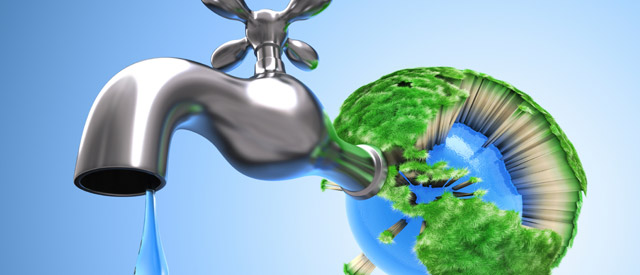 A new sewage treatment process: the vermifiltration. Demonstration-dissemination technically and environmentally integrated
A new sewage treatment process: the vermifiltration. Demonstration-dissemination technically and environmentally integrated
Wastewater, and more generally organically polluted water, is treated by decomposing the organic matter it contains under aerobic or anaerobic conditions. This type of fermentation almost always takes place in a liquid medium (activated sludge, bacteria beds, lagooning, etc.). This requires extremely large surface areas or volumes (extensive lagooning ~ 10 m2/inhabitant equivalent) or the construction of costly plants with complex systems that accelerate decomposition and produce an undecomposed « mass » or sewage sludge which is finally digested in fields or incinerators.
These treatment systems are problematic, both in terms of the space they occupy and of the high investment, running (energy, sludge disposal, etc.) and maintenance costs associated with the complex technology frequently used. This particularly applies to small rural communities such as Combaillaux, which has, like the rest of the Languedoc-Roussillon region, an expanding population (1400 inhabitants in 2003; projected 2200 in 2020). The area is already densely built-up (13 % of area), but there is a strong attachment to the preservation of the local economy and the surrounding countryside. 58% of the land is worked (including vines and olive trees) and 29% of the land is protected (120 hectares is forests).
| Project number | LIFE03 ENV/F/000257 | ||
|---|---|---|---|
| Subject(s) | ANALYSIS AND TESTS , CHARACTERISTICAL PARAMETERS OF WATERS AND SLUDGES , DRINKING WATER AND SANITATION : COMMON PROCESSES OF PURIFICATION AND TREATMENT , HEALTH - HYGIENE - PATHOGENIC MICROORGANISM , INDUSTRY , MEASUREMENTS AND INSTRUMENTATION , PREVENTION AND NUISANCES POLLUTION , SANITATION -STRICT PURIFICATION PROCESSES , WATER QUALITY | ||
| Acronym | RECYCLAQUA | ||
| Geographical coverage | France | ||
| Budget (in €) | 1178068 | ||
| Programme | LIFE | ||
| Web site | http://www.recyclaqua.agropolis.fr/ | ||
| Objectives | The aim of the RECYCLAQUA project was to demonstrate an innovative process for waste water treatment i.e. lumbri-filtration, which uses earthworms to treat Organically Polluted Water (OPW). The waste water treatment station to be set up by the project was to serve a community of 2000 inhabitant equivalents. The project would demonstrate the feasibility, economic and social interest of earthworm filtration for the treatment of organically contaminated liquids. Its operation would be demonstrated in a concrete local situation which would enable an upstream (waste water) and downstream (treated water and its re-uses) evaluation. |
||
| Results | At the end of the project, the lumbri-filtration waste water processing system was operational and used by the town of Combaillaux. The system reached all the quality requirements for processed waste water under French law (level D4: BOD: 25 mg/l; COD: 125 mg/l or 75 %; TSM: 35 mg/l or 90 %). Purification yield objectives were consistently reached and TSM and BOD abatement was of excellent quality with mean yields of 94 and 97 % and the concentrations were always below level D4 thresholds. The primary advantage of the system resided in the minimal amounts of sludge produced; this sludge in fact consisted almost entirely of pre-treatment residue (sieving < 2mm), and was vermi-composted at the plant. After auto-compacting, a volume of solid waste equivalent to one litre of primary waste per 30m3 of water was fed into the vermi-composter. The system also had the advantage of requiring little surface area (0.25 to 0.5 m2/ inhabitant equivalent) and used a minimal amount of energy. It also had a real capacity to absorb major fluctuations in hydraulic load and this was demonstrated. Moreover, it was virtually odourless and noiseless and allowed waste to be monitored from an eco-toxicological standpoint. The lumbri-filtration system presents advantages in economic terms; figures presented by the beneficiary indicate that the investment and maintenance costs are lower than other types of treatment. At the end of the LIFE project, the Conseil Général de l’Hérault financially committed itself to extend the analysis to back up the validation of the lumbri-filtration process. Dissemination and communication activities included: - Press packs and interviews with the national and international media (Chile, Spain, Germany etc.). - Elected representatives from all over France visited the plant and have shown interest in exporting the system to their own wastewater treatment plants. - The project was awarded the first prize in the Eco-Action Trophy, Infrastructure Category, presented by the President of the National Assembly in December 2005. - Educational visits to the plant and workshops and participation in international seminars/meetings (Spain, Chile and Italy) to make the process known to the international community. - Project website in French and Italian (http://lombristation.iamm.fr. and http://www.laap.it), which includes a educational virtual exploration of the plant. |
||
| Period | [03/12/2002 - 30/11/2005] | ||
 you are not logged in
you are not logged in





